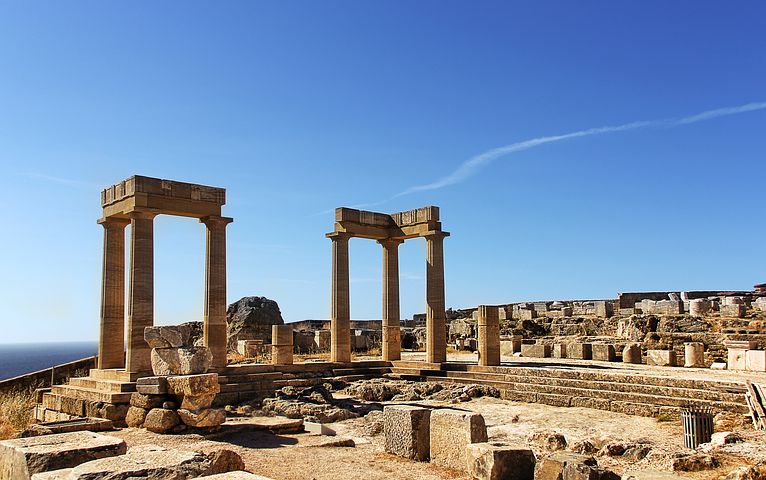
New U of C study abroad in Greece explores the social impact of sports
By Christie Melhorn, March 27 2018 —
Dancing on homemade stilts and biting into ravioli filled with squid ink are just a couple of my favourite experiences while studying abroad. Learning about carnival tradition in the Caribbean and food culture in Spain through the University of Calgary’s Study Abroad program challenged and rewarded me in multiple ways. Applying sociocultural theories to in-field experiences brought fresh relevance to course content and revealed parts of my personality that I didn’t know existed.
This spring, U of C is launching a study in Greece called Sport and Culture in the Ancient World. The program intends for students from all faculties to explore the sociopolitical significance of sports across time and space.
U of C classics and religion professors Reyes Bertolin-Cebrian and Scott Norris will lead the study which departs Calgary for Athens on May 15. Bertolin-Cebrian currently teaches Greek and Roman Studies (GRST) 311: Sport in Ancient Greece and Rome, a course that examines the historical impact of ancient Greek sports. She has also attended an academic conference about the Olympics in Australia in 2000. Norris, who has a kinesiology background, has ten years of experience guiding high school programs in different parts of the world, including Greece. They designed the program to give students a more visceral academic experience than in a traditional classroom.
“Studying ancient history can be really abstract — it’s just a bunch of names and places. If you want to really understand it, you need to go to places like Athens and Delphi,” Norris said. “You can learn about them in books and in lectures but only when you go, you understand why certain places are sacred or have certain meaning. Pedagogically [studying abroad] is more sound and way more fun.”
Students attending the program will receive credits in GRST 311 and GRST 337: Early Greece, which covers historical events in Greece from the Bronze Age to the Persian Wars. The study also includes GRST 491 — an independent, in-field study about a topic related to the program.
GRST 311 — open to all faculties — is notoriously difficult to get into because of its popularity and reputation. That reputation should carry over in Greece, where students will complete assignments rooted in holistic learning principles and receive lectures at famous sites, such as the city of Marathon, where the event received its name.
“Everywhere that we go, there is stadia. We’ll be running on the track [at the Ancient Olympia Archaeological Site] — but with our shoes and clothes on. Not like the traditional ancient Greek way,” Bertolin-Cebrian said. “Students will also recreate other ancient sports. We expect them to demonstrate things like wrestling matches.”
Based on my personal experience, being physically present in the environments you’re studying brings greater interest in course content and personal fulfilment. I still remember choreography created by emancipated Afro-Caribbean slaves that I learned in mirrorless Trinidadian studios. As with dance, studying sports provides great insight on how our physical reality shapes our cultural framework and sense of self. Throughout the program, students will specifically gain a greater understanding of the significance of athletic identity.
“Society shapes sports but sports also shape society. And you can’t study sports without studying the history behind them,” Bertolin-Cebrian said. “Sports psychology in ancient Greece is not studied well but there are inscriptions there about the importance of being tough and making the right decisions. There are many anecdotes about athletes who commit suicide because they can’t compete.”
“[Ancient Greeks] defined themselves by their athletics in a way no other culture does. And it still holds there,” Norris added. “The honours received for winning is enormous and even gives people advantages in the professional lives. If you’re a politician and an Olympian, you’re more likely to succeed.”
Bertolin-Cebrian says that establishing sports as an academic discipline is long overdue.
“It’s about time sports are recognized as an academic discipline. We’ve been studying classic [texts] for the last 300 years but only in the last 50 have we been studying sports academically. ” she said. “Political systems, philosophies, ideologies and religions all change. But some sports are still the exact same from ancient times and should be examined by departments and perspectives including but also outside of kinesiology.”
While the program is almost at capacity and the deadline to apply has passed, there is potentially room for a few more applicants. Regardless, it will likely be regularly offered in future spring terms at the U of C.
To learn more about Sport and Culture in the Ancient World, visit the Centre for International Students and Study Abroad in room 275 on the second floor of MacHall between 8:30 a.m. and 4:30 pm or email group.study@ucalgary.ca.
